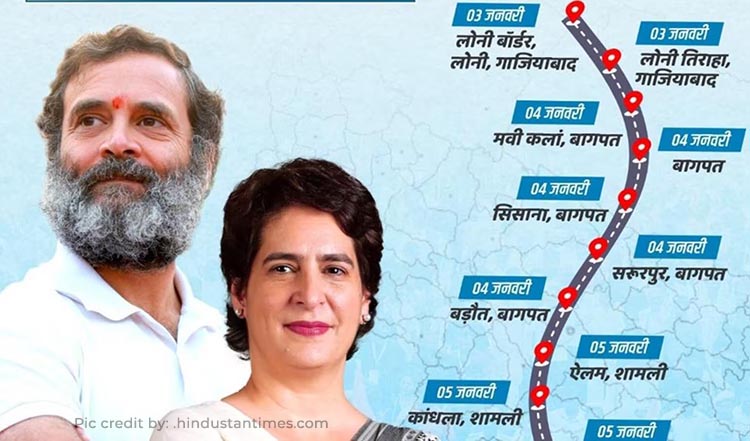Rahul Gandhi Quick Info
| Age | Caste | Profession | Political Party |
| 53 years | Kashmiri Brahmin | Politician | Indian National Congress (INC) |
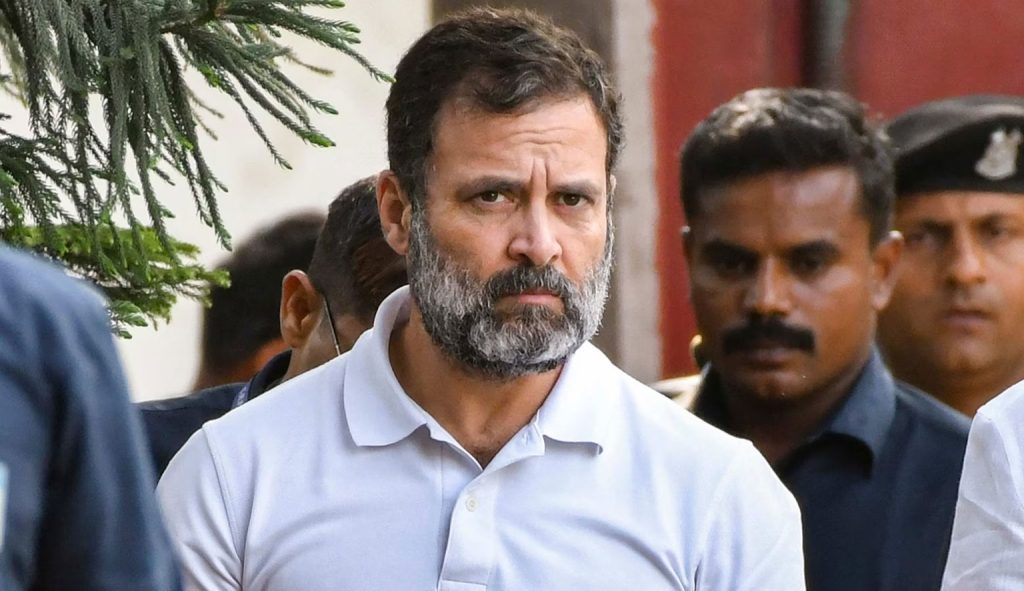
Pic Credit – hindustantimes.com
Biography – Wiki
| Full Name | Rahul Rajiv Gandhi | |||||||||||||||||||||||||||||||||||||||||||||||||||||||||||||||||||||||||||||||||||||
| Nickname | RaGa | |||||||||||||||||||||||||||||||||||||||||||||||||||||||||||||||||||||||||||||||||||||
| Profession | Politician / Member of the Lok Sabha | |||||||||||||||||||||||||||||||||||||||||||||||||||||||||||||||||||||||||||||||||||||
| Physical Stats – Height – Weight & More | ||||||||||||||||||||||||||||||||||||||||||||||||||||||||||||||||||||||||||||||||||||||
| Height (approx.) | In Centimeters - 170 Cm In Meters - 1.70 M In Feet Inches - 5’ 7” |
|||||||||||||||||||||||||||||||||||||||||||||||||||||||||||||||||||||||||||||||||||||
| Weight (approx.) | In Kilograms - 70 Kg In Pounds - 154 Lbs |
|||||||||||||||||||||||||||||||||||||||||||||||||||||||||||||||||||||||||||||||||||||
| Eye Colour | Dark Brown | |||||||||||||||||||||||||||||||||||||||||||||||||||||||||||||||||||||||||||||||||||||
| Hair Colour | Dark Brown | |||||||||||||||||||||||||||||||||||||||||||||||||||||||||||||||||||||||||||||||||||||
| Exploring the Personal Life of Rahul Gandhi | ||||||||||||||||||||||||||||||||||||||||||||||||||||||||||||||||||||||||||||||||||||||
| Date of Birth | Rahul Gandhi was born on 19 June 1970 in New Delhi, India. | |||||||||||||||||||||||||||||||||||||||||||||||||||||||||||||||||||||||||||||||||||||
| Age | As of 2024, Rahul Gandhi is 53 years old. | |||||||||||||||||||||||||||||||||||||||||||||||||||||||||||||||||||||||||||||||||||||
| Birthplace | He hails from New Delhi, India. His ancestral origin is Louisiana, Italy. | |||||||||||||||||||||||||||||||||||||||||||||||||||||||||||||||||||||||||||||||||||||
| Zodiac sign | Rahul Gandhi's zodiac sign is Gemini. | |||||||||||||||||||||||||||||||||||||||||||||||||||||||||||||||||||||||||||||||||||||
| Signature | Insert Sign | |||||||||||||||||||||||||||||||||||||||||||||||||||||||||||||||||||||||||||||||||||||
| Nationality | Rahul Gandhi holds Indian nationality. | |||||||||||||||||||||||||||||||||||||||||||||||||||||||||||||||||||||||||||||||||||||
| Hometown | His hometown is New Delhi, India, with ancestral roots in Louisiana, Italy. | |||||||||||||||||||||||||||||||||||||||||||||||||||||||||||||||||||||||||||||||||||||
| School(s) | Rahul Gandhi attended St. Columba's School in Delhi, India, and The Doon School in Dehradun, Uttarakhand, India. After the assassination of his grandmother, Indira Gandhi, he was mostly home-schooled. | |||||||||||||||||||||||||||||||||||||||||||||||||||||||||||||||||||||||||||||||||||||
| College/University | He pursued his education at St. Stephen's College in Delhi, India, Harvard University in Cambridge, Massachusetts, U.S., Rollins College in Winter Park, Florida, U.S., and Trinity College in Cambridge, England. After the assassination of his father, Rajiv Gandhi, he moved from Harvard to Rollins College, where he completed his study in International Relations and Politics. | |||||||||||||||||||||||||||||||||||||||||||||||||||||||||||||||||||||||||||||||||||||
| Educational Qualification(s) | Rahul Gandhi holds a Bachelor of Arts from Rollins College, Florida, United States, an M.Phil (Economics) from Trinity College, Cambridge, England, and studied International Relations and Politics at Harvard. | |||||||||||||||||||||||||||||||||||||||||||||||||||||||||||||||||||||||||||||||||||||
| Religion | He practices Hinduism. | |||||||||||||||||||||||||||||||||||||||||||||||||||||||||||||||||||||||||||||||||||||
| Caste | Rahul Gandhi belongs to the Kashmiri Brahmin (Dattatreya) caste. | |||||||||||||||||||||||||||||||||||||||||||||||||||||||||||||||||||||||||||||||||||||
| Ethnicity | His ethnicity is Indian and Italian. | |||||||||||||||||||||||||||||||||||||||||||||||||||||||||||||||||||||||||||||||||||||
| Blood Group | Rahul Gandhi has blood group B (-ve). | |||||||||||||||||||||||||||||||||||||||||||||||||||||||||||||||||||||||||||||||||||||
| Food Habit | He follows a non-vegetarian diet. In an interview, he mentioned not liking jackfruit and peas. | |||||||||||||||||||||||||||||||||||||||||||||||||||||||||||||||||||||||||||||||||||||
| Address | His address is 12, Tughlak Lane, New Delhi. | |||||||||||||||||||||||||||||||||||||||||||||||||||||||||||||||||||||||||||||||||||||
| Hobbies | Rahul Gandhi enjoys reading, traveling, scuba diving, and free diving. | |||||||||||||||||||||||||||||||||||||||||||||||||||||||||||||||||||||||||||||||||||||
| Exploring the Family Tree: An Insight into Family Details | ||||||||||||||||||||||||||||||||||||||||||||||||||||||||||||||||||||||||||||||||||||||
| Family | Father: Late Rajiv Ratna Gandhi was an Indian politician who served as the 6th Prime Minister of India from 1984 to 1989. Mother: Sonia Gandhi is an Indian politician & the longest serving president of the Indian National Sister: Priyanka Gandhi Vadra is an Indian politician and the general secretary of the All India Congress Committee in charge of Uttar Pradesh. 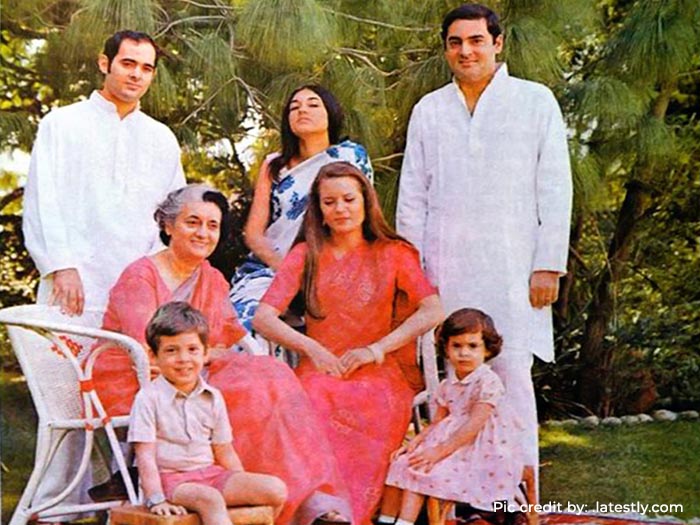 Brother: None |
|||||||||||||||||||||||||||||||||||||||||||||||||||||||||||||||||||||||||||||||||||||
| Rahul’s Political Career | ||||||||||||||||||||||||||||||||||||||||||||||||||||||||||||||||||||||||||||||||||||||
|
||||||||||||||||||||||||||||||||||||||||||||||||||||||||||||||||||||||||||||||||||||||
| Rahul Gandhi’s Electoral performance | ||||||||||||||||||||||||||||||||||||||||||||||||||||||||||||||||||||||||||||||||||||||
Rahul Gandhi's electoral journey has been marked by varying degrees of success. In the 2004, 2009, and 2014 Lok Sabha elections, he contested from the Amethi constituency, securing victories in 2004 and 2009 with substantial vote shares. However, in 2014, his vote shares significantly decreased. The 2019 elections saw a shift, with Rahul Gandhi contesting and losing from Amethi but emerging victorious from Wayanad. Despite the mixed results, his political trajectory showcases adaptability and resilience in the electoral arena.
|
||||||||||||||||||||||||||||||||||||||||||||||||||||||||||||||||||||||||||||||||||||||
| Positions held by Rahul Gandhi | ||||||||||||||||||||||||||||||||||||||||||||||||||||||||||||||||||||||||||||||||||||||
| In public offices, Rahul Gandhi has served in various capacities, starting with his election to the 14th Lok Sabha in 2004. Over the years, he contributed as a member of the Standing Committee on Home Affairs and the Standing Committee on Human Resource Development. His commitment continued in subsequent terms, including his roles in the 15th, 16th, and 17th Lok Sabhas, where he actively participated in committees such as Defence, External Affairs, Rural Development, and Finance. Within the party, Rahul Gandhi has played key roles, holding the position of General Secretary of the INC from 2007 to 2013. Additionally, he has been the Chairperson of both the Indian Youth Congress and the NSUI since 2007. His leadership evolved, with roles such as Vice President from 2013 to 2016 and later taking on the significant responsibility of the President of the INC from 2017 to 2019, succeeding Sonia Gandhi.
|
||||||||||||||||||||||||||||||||||||||||||||||||||||||||||||||||||||||||||||||||||||||
| National Security Perspectives of Rahul Gandhi | ||||||||||||||||||||||||||||||||||||||||||||||||||||||||||||||||||||||||||||||||||||||
| In this segment on national security, Rahul Gandhi's viewpoints and statements on various issues have stirred both public discourse and political debates. Wikileaks Revelation (2010): During the United States diplomatic cables leak, a cable dated 3 August 2009 revealed a lunch hosted by then-Prime Minister Manmohan Singh for Rahul Gandhi. In a candid conversation with the U.S. Ambassador, Timothy J. Roemer, Gandhi expressed his belief that Hindu extremists posed a greater threat to India than Muslim militants. He specifically pointed to polarizing figures within the Bharatiya Janata Party (BJP). These remarks drew sharp criticism from the BJP, with accusations of divisive language and compromising India's fight against terrorism. Muzaffarnagar Riots (2013): After the 2013 Muzaffarnagar riots, Gandhi claimed at an election rally that a police officer informed him about Pakistan's ISI attempting to recruit riot-affected youngsters. However, authorities, including the district administration, UP state government, RAW, and IB, denied such developments. This statement faced heavy criticism, leading to demands for an apology from various political parties. In response to the Election Commission of India's notice, Gandhi clarified that he didn't intend to exploit communal sentiments but was referring to divisive politics. Security Briefings (2013): The BJP raised concerns about Rahul Gandhi, who held no government post, being briefed by intelligence officers on crucial security issues. This raised questions about the nature of such briefings and the appropriateness of involving an individual without an official government role. The Election Commission of India, in November 2013, found Gandhi's explanation insufficient and advised caution in his public utterances during election campaigns. Rahul Gandhi's stance on national security has sparked debates, reflecting the complex and sensitive nature of such discussions within the political landscape of India. |
||||||||||||||||||||||||||||||||||||||||||||||||||||||||||||||||||||||||||||||||||||||
| Lokpal Reform Advocacy | ||||||||||||||||||||||||||||||||||||||||||||||||||||||||||||||||||||||||||||||||||||||
| Rahul Gandhi has advocated for significant changes to the Lokpal system, suggesting that it should be elevated to the status of a constitutional body accountable to Parliament, mirroring the Election Commission of India's structure. This proposal was articulated on 25 August 2011, during the 10th day of Anna Hazare's fast. Gandhi emphasized the need for not just the Lokpal but also a robust political will to effectively combat corruption. However, his statement was perceived by the opposition and members of Team Anna as a delaying tactic, drawing criticism from leaders such as Sushma Swaraj and Arun Jaitley. Subsequently, the Parliamentary Standing Committee, headed by Abhishek Manu Singhvi, presented the Jan Lokpal Bill report in the Rajya Sabha on 9 December 2011. The report endorsed the transformation of Lokpal into a constitutional body, indicating a potential shift towards comprehensive reform in the anti-corruption framework. |
||||||||||||||||||||||||||||||||||||||||||||||||||||||||||||||||||||||||||||||||||||||
| Farmers' and Land Agitation: Rally and Critique | ||||||||||||||||||||||||||||||||||||||||||||||||||||||||||||||||||||||||||||||||||||||
| In a crucial moment on 19 April 2015, Rahul Gandhi took center stage at the Kisan Khet Mazdoor Rally in Ramlila Maidan, addressing the concerns of farmers and workers. With references to his past agitations in Niyamgiri, Orissa, and Bhatta-Parsaul, Greater Noida, Uttar Pradesh, Gandhi drew attention to the struggles faced by these communities. The rally, witnessing the participation of 1 lakh people, became a platform for Gandhi to criticize Prime Minister Narendra Modi. In his speech, Gandhi targeted Modi's assertion in Toronto about "cleaning the mess created by previous governments." He questioned the financing of Modi's election campaigns, alleging that the Prime Minister borrowed substantial funds from industrialists and would repay them by taking away farmers' land and granting it to his industrialist allies. The term "suit-boot government" was coined by Gandhi to mock Modi's high-profile monogrammed suit worn during a meeting with Barack Obama. Additionally, he used the "acche din government" jibe, highlighting the perceived failure of Modi's promised "good days government." As the BJP government introduced a land bill in May, facing criticism from opposition parties, Gandhi accused them of "murdering" the UPA's land bill. He vowed to prevent the passage of the bill, even if it meant taking the protest to the streets. Gandhi asserted that the government diluted the bill, labeling it as "anti-farmer" and drawing a parallel between the legislation and "daylight robbery." On 26 May, marking the first anniversary of the Modi government, Gandhi, at a rally in Kozhikode, expressed disappointment, stating that the celebratory mood was confined to a few powerful friends of the government, leaving farmers and labourers with nothing to celebrate. |
||||||||||||||||||||||||||||||||||||||||||||||||||||||||||||||||||||||||||||||||||||||
| Supporting Women's Empowerment and LGBTQ Rights | ||||||||||||||||||||||||||||||||||||||||||||||||||||||||||||||||||||||||||||||||||||||
| Rahul Gandhi has been a vocal advocate for women's empowerment and gender equality in India, consistently addressing these critical issues. His stance includes a call for increased representation of women in politics and a resolute commitment to eliminate gender-based violence. During the second Manmohan Singh ministry, he threw his support behind the Women's Reservation Bill, aiming for a 33 percent reservation of all Lok Sabha and state legislative assembly seats for women. Gandhi asserted, "Women do not need any protection. If you give them their rights, they can protect themselves." The bill passed in the Rajya Sabha on 9 March 2010, with the provision that the reservation would be in effect for 15 years. However, the bill never went to a vote in the Lok Sabha and eventually lapsed due to its pending status. In 2019, while addressing students in Chennai, Gandhi renewed his call for a 33 percent reservation of parliamentary Lok Sabha and state legislative assembly seats for women, along with government jobs. Additionally, on 6 September 2018, the Supreme Court of India revoked Section 377 of the Indian Penal Code, an act which criminalized homosexual sex between adults. Gandhi had backed the repeal of Section 377 of the Indian Penal Code and the decriminalization of homosexuality, stating that he believed that issues related to personal freedom should be left to the individual. 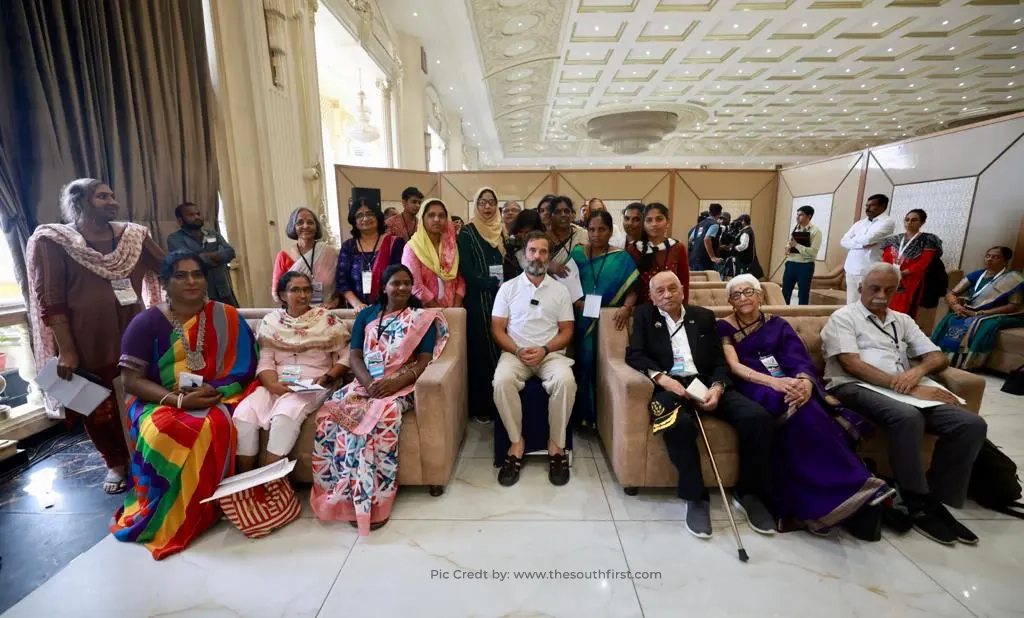 |
||||||||||||||||||||||||||||||||||||||||||||||||||||||||||||||||||||||||||||||||||||||
| Relationships & More | ||||||||||||||||||||||||||||||||||||||||||||||||||||||||||||||||||||||||||||||||||||||
| Affairs/Girlfriends | Veronique Cartelli (Spanish Architect): Rahul Gandhi was romantically linked with Veronique Cartelli, a Spanish architect from Venezuela. The two reportedly met while studying in England and were seen together multiple times, sparking dating rumors. However, in 2004, Rahul Gandhi clarified that Veronique was his best friend, putting an end to the speculations surrounding their relationship. Noal Zaher (Afghan Princess): Another relationship rumor involved Rahul Gandhi and Noal Zaher, the granddaughter of the late Afghan king, Mohamed Zahir Shah. Photographs of the two surfaced, showing them together at Delhi's Aman Hotel and in France. Despite the speculations, details about the nature of their relationship remained private. (Ref Link) 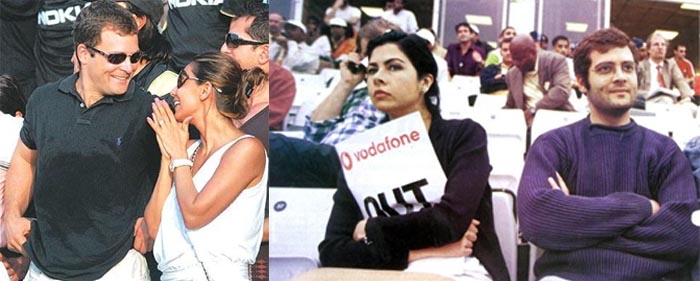 |
|||||||||||||||||||||||||||||||||||||||||||||||||||||||||||||||||||||||||||||||||||||
| Personal Life | ||||||||||||||||||||||||||||||||||||||||||||||||||||||||||||||||||||||||||||||||||||||
| Marital Status | Unmarried | |||||||||||||||||||||||||||||||||||||||||||||||||||||||||||||||||||||||||||||||||||||
| Wife /Spouse | N/A | |||||||||||||||||||||||||||||||||||||||||||||||||||||||||||||||||||||||||||||||||||||
| Children | None | |||||||||||||||||||||||||||||||||||||||||||||||||||||||||||||||||||||||||||||||||||||
| Other Relatives | Grandfather – Late Feroze Gandhi was an Indian freedom fighter, politician and journalist. Grandmother – Late Indira Gandhi was an Indian politician and stateswoman who served as the third Prime Minister of India from 1966 to 1977 and again from 1980 until her assassination in 1984. Uncle – Late Sanjay Gandhi, uncle of Rahul was an Indian politician and the younger son of Indira Gandhi and Feroze Gandhi. Aunty - Maneka Gandhi is an Indian politician and a member of the Lok Sabha, the lower house of the Indian parliament and a member of the Bharatiya Janata Party (BJP). Cousin - Varun Gandhi is an Indian politician and a third-term member of Parliament for Lok Sabha from the Pilibhit constituency. |
|||||||||||||||||||||||||||||||||||||||||||||||||||||||||||||||||||||||||||||||||||||
| Favorites and Hobbies | ||||||||||||||||||||||||||||||||||||||||||||||||||||||||||||||||||||||||||||||||||||||
| Food | Rahul Gandhi has a preference for a variety of dishes, including noodles, coastal Indian dishes, seafood, chicken tikka, seekh kebab, mutton, and omelette. | |||||||||||||||||||||||||||||||||||||||||||||||||||||||||||||||||||||||||||||||||||||
| Restaurant(s) | Among his favored dining establishments are Moti Mahal in Delhi, along with Sagar, Swagat, and Sarvana Bhavan. | |||||||||||||||||||||||||||||||||||||||||||||||||||||||||||||||||||||||||||||||||||||
| Politician(s) | In terms of political figures, Rahul Gandhi holds his father, Rajiv Gandhi, and his great-grandfather, Jawaharlal Nehru, in high regard. | |||||||||||||||||||||||||||||||||||||||||||||||||||||||||||||||||||||||||||||||||||||
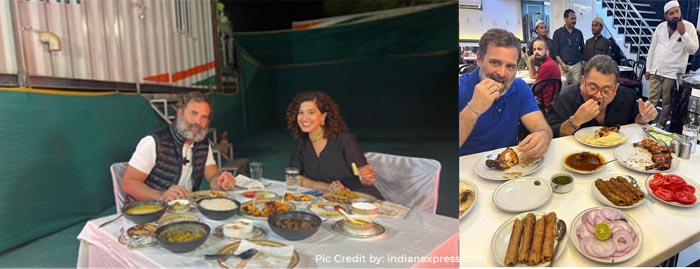 |
||||||||||||||||||||||||||||||||||||||||||||||||||||||||||||||||||||||||||||||||||||||
| Style Quotient, Assets & Properties | ||||||||||||||||||||||||||||||||||||||||||||||||||||||||||||||||||||||||||||||||||||||
| Cars Collection | Tata Safari: Rahul Gandhi owns an older-generation bulletproof Tata Safari, with the specifics of its engine modifications remaining unclear. Toyota Fortuner: The collection includes two Toyota Fortuner SUVs, offering a choice between a 2.7-litre petrol engine and a robust 2.8-litre turbo-diesel engine. The SUVs feature 6-speed manual or automatic transmissions and a 4x4 system for versatile terrain conquering. Honda CR-V: Rahul Gandhi's lineup features the Honda CR-V, a premium mid-size SUV, equipped with a discontinued 2.4-litre petrol engine and a 5-speed automatic gearbox. Toyota Land Cruiser: Completing the collection is the Toyota Land Cruiser, an older model boasting a reliable 4.4-litre diesel engine, automatic transmission, and formidable off-road capabilities. (Ref Link) |
|||||||||||||||||||||||||||||||||||||||||||||||||||||||||||||||||||||||||||||||||||||
| Assets / Properties | Immovable Assets: - Rahul Gandhi owns a piece of farmland in Delhi's Sultanpur Village and two office premises in Gurgaon, with a total worth of Rs. 10.08 Crore. Movable Assets: - Gold Holdings: 333.3 gm of gold jewellery valued at Rs. 5.80 Crore. - Financial Instruments: Bonds, debentures, and shares with a combined value of Rs. 5.19 Crore. - Liquid Assets: A bank balance amounting to Rs. 17.93 lakh. - Cash in Hand: Rs. 40 thousand. 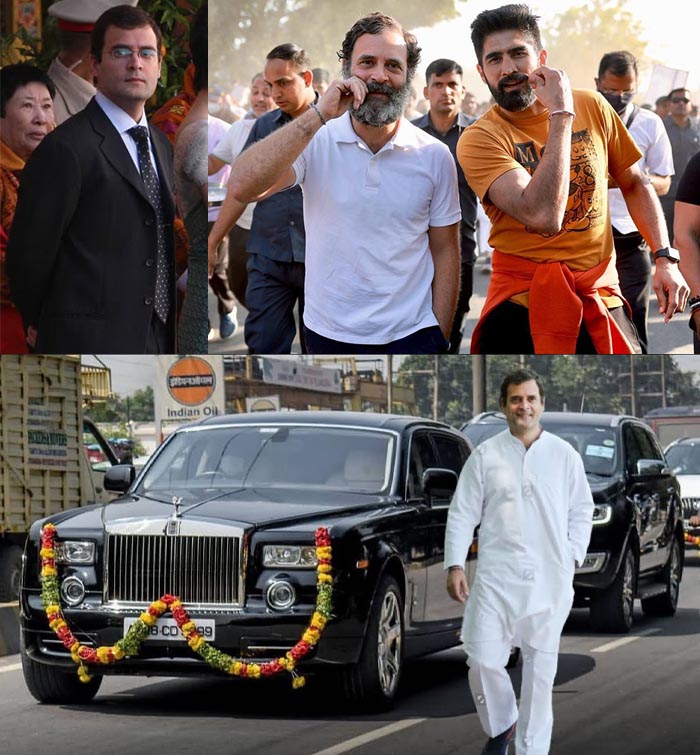 |
|||||||||||||||||||||||||||||||||||||||||||||||||||||||||||||||||||||||||||||||||||||
| Salary, Net Worth & Monthly Income | ||||||||||||||||||||||||||||||||||||||||||||||||||||||||||||||||||||||||||||||||||||||
| Salary | Rs. 1 Lakh + other allowances (As an MP) | |||||||||||||||||||||||||||||||||||||||||||||||||||||||||||||||||||||||||||||||||||||
| Net worth | Rs. 15.88 Crore (as of 2019) | |||||||||||||||||||||||||||||||||||||||||||||||||||||||||||||||||||||||||||||||||||||
| Monthly Income | N/A | |||||||||||||||||||||||||||||||||||||||||||||||||||||||||||||||||||||||||||||||||||||
| Yearly Income | N/A | |||||||||||||||||||||||||||||||||||||||||||||||||||||||||||||||||||||||||||||||||||||
Unveiling the lesser-known facets of Rahul Gandhi’s life
Rahul Gandhi’s Early Life
- Born on June 19, 1970, in Delhi to Rajiv Gandhi and Sonia Gandhi, Rahul Gandhi is the first of their two children.
- His paternal grandfather, Feroze Gandhi, was a Parsi from Gujarat, and he is the great-grandson of India’s first prime minister, Jawaharlal Nehru. (Supporting Pic Required)
- Gandhi’s younger sister is Priyanka Vadra, and his brother-in-law is Robert Vadra.
- He attended St. Columba’s School, Delhi, and later joined the all-boys’ boarding The Doon School in Dehradun from 1981 to 1983.
- Due to security threats faced by the family from Sikh extremists after the assassination of Prime Minister Indira Gandhi, both Rahul and his sister Priyanka were homeschooled.
- In 1989, he joined St. Stephen’s College, Delhi, but later moved to Harvard University after completing the first year examinations. (Supporting Pic Required)
- Following the assassination of his father, Rajiv Gandhi, in 1991, he shifted to Rollins College in Florida, USA, due to security concerns, earning his B.A. in 1994.
- In 1995, he obtained a Master of Philosophy (MPhil) from Trinity College, Cambridge.
- Before entering politics, Gandhi worked at the management consulting firm Monitor Group in London for three years.
- He returned to India in 2002 and established his technology consultancy, Backops Services Private Ltd, in Mumbai.
- Gandhi also opened BackOps UK, a firm acquiring defense contracts from foreign companies supplying to the Indian armed forces.
Unknown facts about Rahul Gandhi
- Rahul Gandhi is the great-grandson of India’s first Prime Minister, Jawaharlal Nehru.
- Due to Sikh extremism after Indira Gandhi’s assassination, Rahul and his sister were primarily home-schooled.
- After his father’s assassination in 1991, he shifted from Harvard University to Rollins College for security reasons. (Supporting Pics Required)
- He used the pseudonym “Raul Vinci” during his college days to maintain his identity secret. (Supporting Pics Required)
- His first job was at the management consulting firm Monitor Group in London, where his first paycheck was around £2500 or £3000.
- In 2004, he contested his first Lok Sabha election from Amethi constituency in Uttar Pradesh and won with a victory margin of over 1 lakh.
- Until 2006, Rahul Gandhi did not hold any position in the Indian National Congress.
- He was elected President of the Indian National Congress in December 2017, running unopposed.
- Rahul Gandhi holds a black belt in Aikido, a modern Japanese martial art, and was a college boxer.
- On July 21, 2018, during a speech in parliament, Rahul unexpectedly hugged PM Narendra Modi and winked towards party colleagues.
- During a visit to Singapore in 2018, a journalist questioned the development under his government (Congress Regimes).
- Social media often mocks him as ‘Pappu,’ a term first used by former cabinet minister Venkaiah Naidu in the Lok Sabha.
Economic Concerns and Critiques
Rahul Gandhi’s perspectives on economic issues were articulated during his address to the All India Congress Committee (AICC) in Jaipur. He emphasized the need to eliminate bureaucratic red tape and outdated laws hindering job creation. Gandhi criticized the economic policies of the Modi Government, asserting that they primarily favored a small group of billionaires, whom he referred to as “crony capitalists.” He specifically targeted Indian billionaire Gautam Adani, accusing the government of showing undue favoritism. Gandhi expressed concerns about the privatization of government assets and alleged collusion between the RSS and crony capitalists to influence India’s economic direction. Despite his critique, he clarified that he is not anti-business and advocates for fairness in economic policies. Gandhi vehemently disagreed with the privatization of Public Sector Undertakings (PSUs) and vowed that Congress would prevent such measures if it came to power. Additionally, he linked the rising economic inequality to the Modi Government’s economic policies, referencing a report by Oxfam.
Critique of Demonetization
Rahul Gandhi’s stance on the Modi government’s demonetization initiative, which involved invalidating ₹500 and ₹1,000 banknotes, has been marked by strong criticism. Describing it as a “tragedy” and a “disaster,” Gandhi contends that the policy has adversely affected both the Indian economy and the lives of ordinary citizens. He accuses the government of implementing demonetization without sufficient planning, leading to substantial hardships for the poor and vulnerable segments of society.
Gandhi labels demonetization as a fundamental failure of policy design and alleges that it was a deliberate move by “PayPM” to benefit a select few billionaires, allowing them to monopolize the economy. Referring to demonetization as the country’s “biggest scam,” Gandhi consistently emphasizes these points in his public speeches and political rallies.
Furthermore, he argues that the policy failed to achieve its primary objectives of combating black money and curbing corruption. Gandhi contends that demonetization, executed without proper consultation with experts or opposition parties, resulted in significant disruptions for farmers, job losses in small and medium-sized businesses, and hardships for workers in the informal sector.
Advocacy for Environmental Concerns
Rahul Gandhi expresses deep concern regarding global environmental degradation, emphasizing the need to elevate these issues to the political forefront for the attention they deserve. Gandhi asserts that without becoming political focal points, environmental challenges may not receive the necessary consideration.
In particular, he critiques the draft of the 2020 Environment Impact Assessment (EIA), deeming it “dangerous” with potential harmful consequences in the long term. Gandhi characterizes this draft as a disaster, expressing the view that it could stifle the voices of communities directly impacted by environmental degradation.
Rahul Gandhi’s & Narendra Modi Rivalry
Rahul Gandhi and Narendra Modi are prominent political figures in India, representing two major political parties: The Indian National Congress (INC) and the Bharatiya Janata Party (BJP), respectively.
The rivalry between Rahul Gandhi and Narendra Modi is a central aspect of Indian politics. Rahul Gandhi, scion of the Nehru-Gandhi family, has been associated with the Congress party for several generations. In contrast, Narendra Modi, a charismatic leader, rose through the ranks of the Rashtriya Swayamsevak Sangh (RSS) and the BJP.
Their rivalry is characterized by ideological differences, with Rahul Gandhi often focusing on issues of social justice, inclusivity, and welfare programs, while Narendra Modi emphasizes economic development, national security, and a strong leadership approach.
The political battles between the Congress and the BJP, with Rahul and Modi as their respective faces, have been a defining feature of Indian elections. The competition has witnessed intense debates, contrasting policy proposals, and attempts to shape the narrative around governance, development, and the country’s future trajectory.
Note:- It’s important to note that the political landscape is dynamic, and the nature of this rivalry may evolve over time based on changing circumstances and political dynamics in India.
Rahul Gandhi’s Controversies
- National Herald Corruption Case: Rahul Gandhi, along with other Congress leaders, faced accusations in the National Herald corruption case. However, in December 2020, the Delhi court dismissed a petition by Subramanian Swamy, stating there was no prima facie evidence of their involvement in any corruption conspiracy.
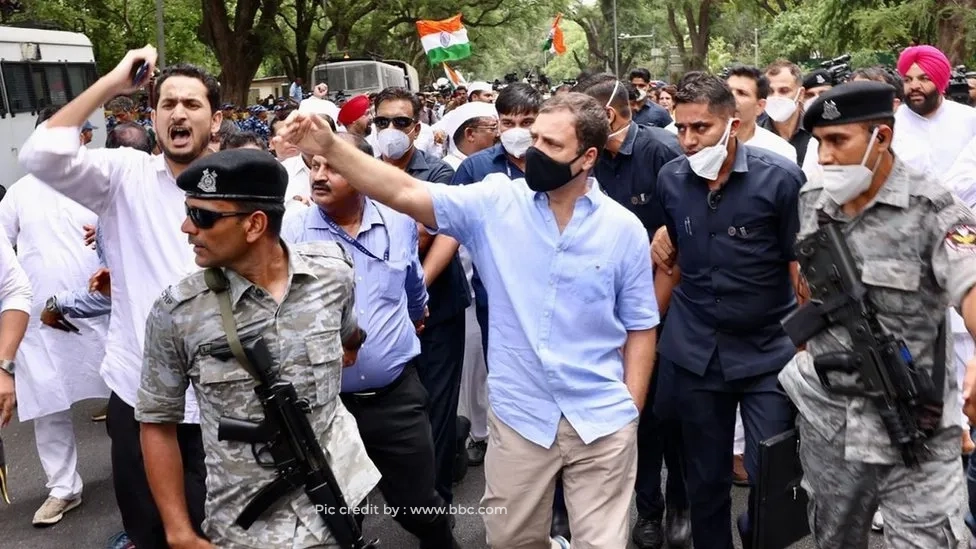
- Hindu Extremism Comment (December 2010): In December 2010, Gandhi faced criticism for stating that Hindu extremism is more dangerous than Islamic militancy.
- College Certificate Discrepancy (February 2014): Rahul Gandhi faced criticism when discrepancies were found in his college certificate regarding his name and date.
- Rape Allegation (October 2012): He faced an allegation of rape in Uttar Pradesh in 2012, which was later dropped by the Supreme Court.
- Poverty Statement (August 2013): Gandhi was criticized for stating that poverty is only a “state of mind” in August 2013.
- Arrest for Protesting (May 2011): In May 2011, Rahul Gandhi was arrested for protesting against a highway project along with farmers at Bhatta Parsaul village.
- UK Comment Row (March 2023): In March 2023, Rahul Gandhi was accused by the BJP of defaming India during an event in London where he sought foreign intervention to “save democracy” in India.
- Remarks on Women Being Sexually Assaulted (March 2023): Delhi police served notice to Rahul Gandhi in March 2023 over his remarks on women being sexually assaulted during his Bharat Jodo Yatra in Jammu and Kashmir.
- “Panauti” Remark on PM (November 2023): Gandhi faced controversy for referring to Prime Minister Narendra Modi as a ‘panauti’ (ill omen) during an election rally in Rajasthan in November 2023.
- Flying Kiss Controversy (August 9, 2023): During a Lok Sabha debate on August 9, 2023, Rahul Gandhi faced criticism for seemingly blowing a flying kiss towards the treasury benches, with Smriti Irani describing the behavior as misogynistic.
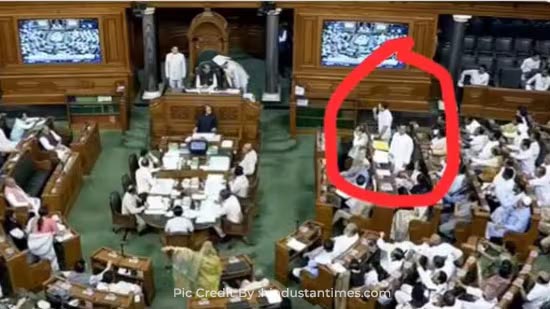
Rahul Gandhi: A Journey of Challenges and Triumphs
In the intricate tapestry of Indian politics, Rahul Gandhi emerges as a figure marked by both challenges and triumphs. Through the pages of his biography, one witnesses the evolution of a man navigating the complexities of family legacy, political controversies, and the demands of leadership. Rahul’s foray into politics, marked by a blend of criticism and acclaim, reflects the resilience of a leader who has weathered storms and remained a prominent force in Indian politics. His commitment to addressing social issues, economic policies, and environmental concerns showcases a man evolving with the times. Rahul Gandhi’s journey is a testament to the endurance required for leadership, making him a figure who has successfully carved his niche in the political landscape
Rahul Gandhi – Presence and Activity on Social Media.
Rahul Gandhi Facebook
Frequently Asked Questions
Who is Rahul Gandhi?
Rahul Gandhi is an Indian politician and a member of the Indian National Congress party.
What is his full name?
His full name is Rahul Rajiv Gandhi.
When was Rahul Gandhi born?
Rahul Gandhi was born on June 19, 1970.
What is his family background?
He comes from the Nehru-Gandhi family, with his father being Rajiv Gandhi, a former Prime Minister of India.
What is his educational background?
Rahul Gandhi attended Rollins College in the United States and later Trinity College, Cambridge in the UK.
What is his political career timeline?
Rahul Gandhi entered active politics in 2004 and has since served in various capacities within the Indian National Congress.
Has he held any significant positions within the Congress party?
Yes, Rahul Gandhi has served as the Vice President and later as the President of the Indian National Congress.
What are some key political issues Rahul Gandhi has focused on?
He has addressed issues related to farmers, unemployment, economic policies, and environmental concerns.
How successful has he been in elections?
Rahul Gandhi has won multiple elections to represent the Amethi constituency in the Lok Sabha.
What is Rahul Gandhi's stance on economic policies?
He has been critical of certain economic policies, particularly those he perceives as benefiting a few wealthy individuals.
Has he been involved in any controversies?
Yes, Rahul Gandhi has faced controversies related to comments on Hindu extremism, remarks during public rallies, and legal cases like the National Herald case.
What is his view on women's empowerment?
Rahul Gandhi has advocated for increased representation of women in politics and has supported initiatives for women's empowerment.
What is his stand on LGBTQ rights?
He has supported the decriminalization of homosexuality and spoken about the importance of personal freedom.
What languages does Rahul Gandhi speak?
Rahul Gandhi is known to speak English, Hindi, and some regional languages.
What is his position on climate change?
Rahul Gandhi has expressed concern about environmental degradation and has criticized certain environmental policies.
What are his views on foreign policy?
He has spoken about the need for an alternative vision in collaboration with democratic nations, particularly in manufacturing.
How does Rahul Gandhi engage with the Indian diaspora?
Unlike Modi, Rahul Gandhi focuses more on engaging with liberal institutions in Western democracies rather than the diaspora.
What is his approach to countering China's influence?
Rahul Gandhi has expressed concerns about China's hegemony and has called for democratic nations to work together as an alternative.
What legal cases has Rahul Gandhi been involved in?
He has been involved in the National Herald corruption case, UK comment row, and others.
Has he been accused of any criminal activities?
No, Rahul Gandhi has not been accused of any criminal activities.
What is his stance on demonetization?
Rahul Gandhi has been critical of demonetization, calling it a tragedy and alleging it was intended to benefit a few billionaires.
How has he dealt with criticisms about his leadership style?
Rahul Gandhi has addressed criticisms by emphasizing his commitment to inclusive politics and democratic values.
What is his take on the National Herald case?
He has been granted exemptions and the court dismissed a petition, labeling it politically motivated.
How does he engage with the youth in India?
Rahul Gandhi has been involved in initiatives like the Indian Youth Congress and the National Students' Union of India.
What are Rahul Gandhi's future political aspirations?
His political future remains uncertain, with periodic speculations about his role and potential leadership within the Congress party.
